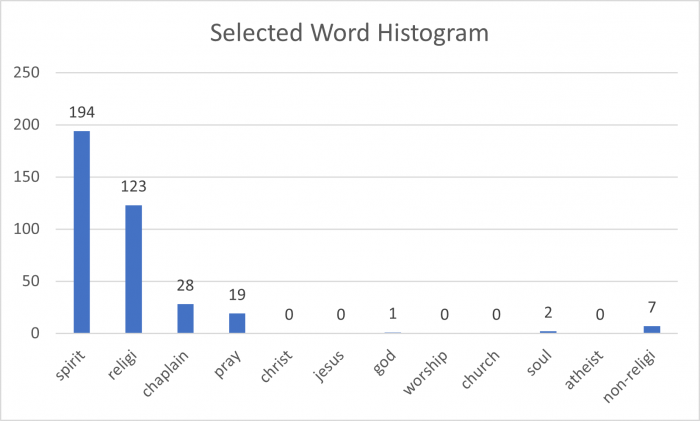Army Publishes New Holistic Fitness with Secular Spirituality
The Army’s new Publication of Field Manual 7-22 (FM 7-22 Oct 2020 Change 1) includes Chapter 10 “Spiritual Readiness.” The new chapter has a strong secular component and avoids the one-size-fits-all Christian spirituality that has tended to haunt the spiritual fitness efforts of the past. Religious solutions are available but not presented as being for everyone. While this publication stays entirely silent on the subject of atheists and humanists, there is a healthy priority on science-based solutions for everyone.

The new manual is titled “Holistic Health and Fitness” or “H2F” and draws heavily from the work of Lisa Miller, PhD, who specializes in spirituality studies and coaching and works out of the Spirituality Mind Body Institute at Columbia University, which offers a related Master of Arts program. Dr Miller earned her PhD in Psychology at UPenn under Martin Seligman, founder of positive psychology, which was a foundation for earlier military spirituality studies and activities. The program promotes science-based foundations and includes Pillars like Leadership, Mental Health, Research, Nature, and Education. Her research and asserted benefits are found throughout FM7-22, promising a broad array of mental and physical health benefits as a result of her research.
Fortunately, these asserted benefits come from a PhD in a related field who studied as a prestigious university. The military has done well to take advantage of prevailing scientific theory. While some may object, the credentials are very strong. In addition, the work, while including sections more specific to traditional religion like sacraments and prayer, most sections include activites of broad applicability including Meetings, Charity, Hospitality, Journaling, Meditation, Education, and Reading.
Additionally, the Spirituality section leads to a Spiritual Readiness Assessment. This assessment includes areas of Personhood, Identity, Growth, Agency, Coping, and Connection. The assessment is built upon questions that everyone can identify with. Some may give answers related to the supernatural or divine, but even fervent atheists should strengthen themselves in these areas. And nontheistic commitments and religious philosophies such as humanism offer answers.
MAAF is working with chaplains to build its existing materials specifically to address growth in areas of spiritual readiness. It is a simple fact that atheists, humanists, and other nontheists prefer to avoid traditionally supernatural terms like ‘spirit’, it is also true that the regulation defines Spirituality in an entirely secular way
“Spiritual readiness develops the personal qualities a person needs in times of stress, hardship, and tragedy … from religious, philosophical, or human values … It applies to both religious and non-religious persons and concepts.”
FM 7-22 Oct 2020 Change 1 Section 10-1
This secular approach and acknowledgement of the “non-religious” is very encouraging. In addition, the lack of acknowledgement of atheists or humanists by name is consistent as no specific beliefs are called out anywhere in the regulation. The word “god” (lower-case) is only mentioned once. However, there are 3 additional references to “those having no religion.” This reveals a potentially problematic perspective that some people have religion and some people just want to opt out, or that they believe in nothing. This is of course not the case and there are inspiring life philosophies to build upon.
Of particular concern is the ongoing commitment of chaplains “only” to support religious ideas. MAAF members throughout the world are turned away because they don’t have a religion their chaplain accepts. This is despite no military definition of religion that excludes nontheists. The word “religion” is conspicuously excluded from a long list of definitions at the end of the manual. However, sections 10-4 through 10-8 introduce the Spiritual Readiness chapter with several sections of legal disclaimers and claims. Included in that is a definition of religion.
“Religion may be described as a set of beliefs concerning a divine or transcendent cause, nature, and purpose of the universe typically accompanied with devotional and ritual observances along with an accompanying moral code governing the conduct of human affairs.”
FM 7-22 Oct 2020 Change 1 Section 10
This definition diverges from the existing definition in Department of Defense Directive (DoDD) 1350.2 (2020) and repeated in other locations which does include nontheists. In addition, a Field Manual is not a valid publication for a legal definition of a term, nor would it supersede a Department of Defense Directive.
The definition in the FM is followed by a reference to Army Techniques Publications 1-05.03 and 1-05.04. Those publications have a broad definition. Selecting just a two of many examples, ATP 1-05.03 says “religion identifies “ultimate concerns”, those things for which individuals or groups are willing to live or die…. even those identified as primarily atheist”. ATP 1-05.04 says, “The word religious when describing the Chaplain Corps role of religious support is not limited solely to strict matters of religion as the term is commonly defined.” ATPs expand upon FMs, in this case FM 1-05 which relates to Religious Support, which diligently avoids a definition of religion. So it seems the FM exceeds its authority and even its own references is its novel exclusion of atheists from religious support.
The modern history of “spirituality” and “spiritual fitness” grew out of a late-2000s raft of scandals related to harassment, hazing, and especially post-traumatic stress related to wars in Iraq and Afghanistan. The Air Force was the initial proponent but all services made efforts quickly, and the Army led many initiatives due to their larger population. Military leaders listened to legitimate mental health providers regarding the urgent need to help Soldiers suffering from frequent combat deployments. Then Christian evangelists stepped in to ensure their message was heard. The new spirituality regulation reins in evangelism in favor of approaches accessible to everyone.
Start the discussion about spirituality in the military, your thoughts about this new regulation, and other relevant precedents. Humanists and other nontheists should be able to work with a term like “spirituality” when it is used for a predominantly inclusive publication like this one.
